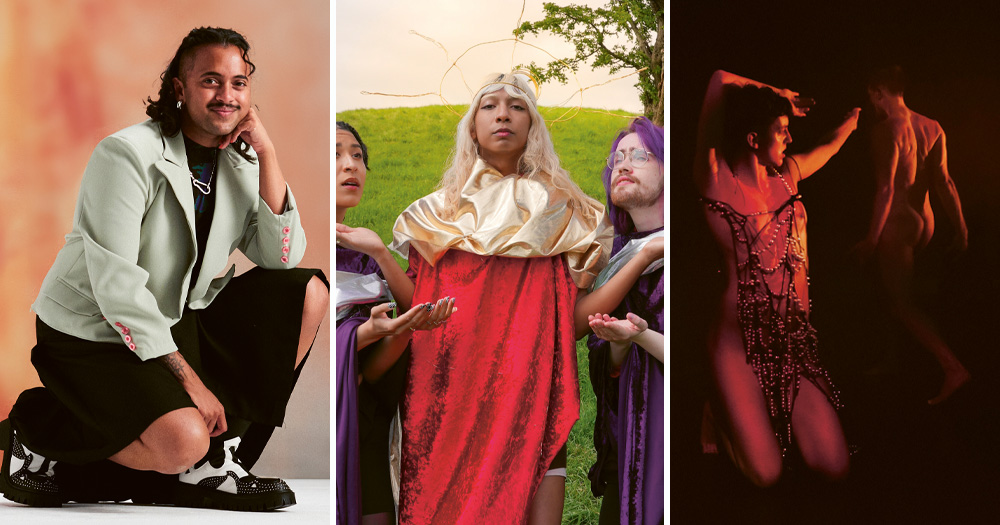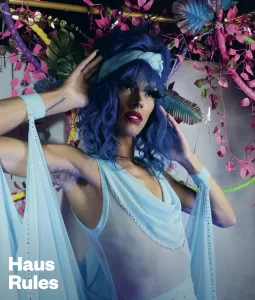“I think with the state the world is in, no one is going to listen unless you’re speaking in these very large and utopian ways,” says Venus Patel, echoing the world-altering ambitions of queer and trans artists across this year’s Dublin Fringe. Utopian futures are seeded throughout the programme, and four future-minded performers spoke to James Hudson about heaven, hope and having a baby through dance and performance at the 2024 festival.
TEARMANN AITEACH/QUEER SANCTUARY
If you were to pitch your Dublin Fringe show Tearmann Aiteach/Queer Sanctuary in your own words, what would you say?
Fearghus Ó Conchúir: It’s a dance show. It’s a duet for these two bodies, one that’s gendered male and one that’s gendered female, and it’s about taking space for pleasure in the possibility of these bodies that isn’t dependent on the usual patriarchal formats that these bodies might be easily arranged into. So it’s about fun.
Isabella Oberländer: There’s a lot of joy, and there’s pearls and there’s silk, and there will be sweaty bodies and some good tunes. It’s interesting to share what we have found in dancing together with whoever wants to come and join or sit back and enjoy the show, because it’s just like we’re holding space. But everybody who comes is complicit, in a way, even just with their presence.
Where did the bilingual title come from?
FOC: I grew up in the Gaeltacht in Ring, I have often had Irish language titles in my work. It’s slightly resistant, it’s just making it a little bit complicated. It used to be TG4 that had its tagline as ‘Súil Eile’ (another eye). And it was just like reminding people that there is another way into this, another kind of life, world, culture, whatever it is.
Is this show an extension of or departure from the ways you usually engage with audiences?
IO: I have often done stuff in kind of unusual spaces, like in gallery spaces or outside where your proximity to the audience is very close. This boundary is malleable, it’s permeable, where there is not like an ‘us’ and ‘them’. It’s more about finding solidarity in the space together and seeing who has shown up today, and how we have shown up today, and where we can go.
FOC: I guess we’re dancing in this way to claim a space for possibilities, for the potential of these queer bodies, for the potential for transformation; inviting other people not to do what we do, but to do what they need to do in claiming their space. That means that our performing is not a representation of something, it’s a doing.
Rebecca Solnit wrote a work on hope, and hope is the possibility that things might be different. For me, we’re dancing in the hope that things might be different, and in fact, trying to make it different now, even if it’s only for this 70 minutes.
There’s been a renewed push for ‘queer pleasure’ when discussions around ‘queer joy’ lack in sensuality, physical embodiment. Are you attempting to reclaim queer nudity and sexuality in a way?
IO: Where the nudity came from was that we actually went skinny dipping, it was by a lake, and it was October, it was bloody freezing, but there was this thing of like— are we gonna go in? It’s cold. Are we gonna go in? Are we really, really, really, really gonna go in? So it’s crossing that gateway. And once you’re in, especially when you skinny dip past that tiny aspect of risk, it kind of frees it in a different way. It’s like it might just be your swimming trunks, but something opens that hadn’t opened before.
View this post on Instagram
MONSTERS
How would you describe your queer Dublin Fringe show Monsters if you were just chatting to a friend?
Venus Patel: I do always start off with “It’s a queer reimagining of the end of the world” because it is such a big statement, and I feel like it gets what I’m saying across.
I play Daisy, this trans, apocalyptic, emphatic preacher, and the show itself is kind of a ritualistic mass. It’s inspired by my background of growing up Catholic and Hindu, and kind of merging these elements together.
But it also takes a lot of this language of Christian and evangelical preachers and re-appropriates that to talk about this idea of monstrosity and the beauty of monstrosity. I want to shine a light on how this idea of difference has separated us in a lot of ways, and with this mass, I want to create a sense of community with the 75 minutes that I have.
Your work has that DIY vibe where you can very much see the artist’s handprints in the craft.
VP: There’s definitely a very DIY aesthetic to a lot of it, especially because I don’t know how to do anything. I like the DIY aesthetic, especially with this project, because creating it ourselves is tying back into this idea that we’re having to create this new world as well, having to do that ourselves and build it from our own hands. I think it really ties in well with what I’m trying to say in the work.
Were you consciously creating a piece of art for Dublin Fringe where transness, queerness, is something that people actively engage and rejoice in?
VP: A lot of this work is very much about taking transness and queerness as something to be celebrated. With a lot of my work, I’m trying to put myself forward and show an alternative mode of being by allowing this freedom of expression and freedom of the true queer identity to come to the forefront. With parts of the show being quite participatory, I wanted people to feel really welcomed in the space, but also that they are a part of this, that we’re all journeying toward this apocalypse together.
If you were walking down the street and Daisy from another universe jumped through the Portal and started preaching, do you think you would come to her altar yourself?
VP: I think I would. I would think it was crazy at first, but I think, yeah, there’s this real beauty in what she does. I would be very curious, yeah, and I do think deep down, she’s a sweetie pie. She’s not this big preacher persona all the time. She does have a more calmed down sense as well, when she lets you into her world.
View this post on Instagram
FIRST TRIMESTER
What is the queer Dublin Fringe show First Trimester about?
Krishna Istha: It’s about me and my partner wanting to start a family and looking for a sperm donor, and we’re doing it through this vehicle of the show where I essentially sit on stage for up to nine hours depending on the show, and I interview strangers in hopes of finding us this sperm donor.
How did you go from the idea of this show to putting it on stage?
KI: I think we started making this show in like 2020, so it took about three, four years for it to actually get its first premiere. Anyone from the public could come in and out of the making process, and it really helped us create the questions I ask these potential donors.
Most of the questions we got, me and my partner were like, “Whoa. Never thought about that. That is a really good question to ask.” Like, “How did you play as a child?”, “If you were to donate sperm to us, would your parents think they’re grandparents to this child?” Expanding how their family unit might interact with our family unit.
How have the shows been going?
KI: It’s been going well. It’s also really interesting to see how the conversations in different places are so different because of the laws and also the culture around queer and trans people.
In Denmark, they’re given a number at birth. And if you’re assigned female at birth, you’re given, like, I can’t remember if it’s even or odd. And you can never change the number, because literally everything is connected to this number. So there was an interesting thing about how you obtain legal parenthood if you’ve changed genders, but this number never changes, then that goes on the kid’s birth certificate. It was interesting how they had a completely different set of problems to what the UK has.
How involved has your partner been in this show?
KI: He watches every single interview. He sits in the audience. I did give him the option to sit with me on stage and ask questions, but what it has become is that he sits in the audience and heckles me instead.
Sometimes people ask me questions that I can’t answer, and I throw it to him, or they ask me questions about my partner, and I’m like, well, he’s right there so you could just ask him. He is the second performer, in a way.
Is it a very collaborative process behind the scenes?
KI: Yeah, very collaborative. Me and my producer, Ruby Glaskin, we put together a team who are all queer people who are either looking to have children at the moment, or hope to in the future, or are hoping to be surrogates, or are children born through products of sperm donation, or have used sperm donors in the past.
Everyone was quite invested in the topic at hand and also the show itself. I promise them all that this child’s middle name is gonna be theirs but I’m not entirely sure how many middle names a child can actually have.
Are you open to other people putting this show on themselves, in their own local context?
KI: Yeah, absolutely. One of the collaborators is Suzanna Hurst, who’s a coder and an artist, and the questions I ask on stage are in this thing that we call the ‘randomiser’. So we have like 400 questions that we’ve gathered from all the queer and trans people that came into the research and development week, me, my partner, all of the other team, and these questions are categorised into philosophical, ethical, medical, really easy, really funny, really hard questions.
The hope is that eventually, Sue will create some sort of app where we can put all these questions, and people can just download it and use it, so if they have a potential sperm donor that they would get to know them a bit better before they pick this person.
Anything left that you want Dublin Fringe audiences to know about this upcoming queer show?
KI: That they should sign up to participate! It’s not that scary!
View this post on Instagram
Catch Tearmann Aiteach/Queer Sanctuary, Monsters, First Trimester and so much more at Dublin Fringe’s 30th anniversary festival, running from September 7 to 22. For more information and to book tickets, visit fringefest.com.
© 2024 GCN (Gay Community News). All rights reserved.
This article was published in the print edition Issue No. 385 (August 1, 2024). Click here to read it now.
Support GCN
GCN is a free, vital resource for Ireland’s LGBTQ+ community since 1988.
GCN is a trading name of National LGBT Federation CLG, a registered charity - Charity Number: 20034580.
GCN relies on the generous support of the community and allies to sustain the crucial work that we do. Producing GCN is costly, and, in an industry which has been hugely impacted by rising costs, we need your support to help sustain and grow this vital resource.
Supporting GCN for as little as €1.99 per month will help us continue our work as Ireland’s free, independent LGBTQ+ media.

